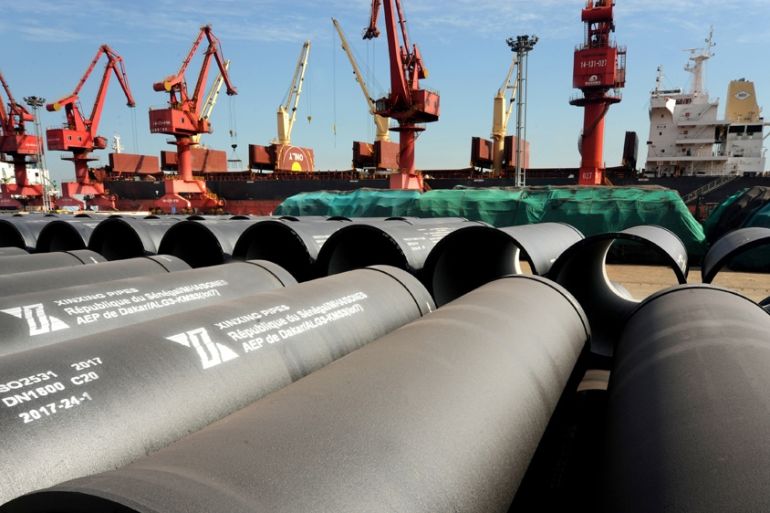US and China plan to hold talks amid thaw in trade war
China says it has made plans for trade talks with the US in January following ‘intensive’ telephone calls.

Trade negotiators from the United States and China are planning to meet in early January for talks, the Chinese commerce ministry said on Thursday, as the world’s two largest economies advance efforts to resolve a months-long trade war.
“Intensive” telephone calls will continue in the meantime, Gao Feng, the ministry’s spokesman told reporters, adding that consultations had been progressing steadily despite the Christmas holiday in the US.
Keep reading
list of 4 itemsIndia’s income inequality widens, should wealth be redistributed?
Facebook, Instagram face EU scrutiny over addictive effects on children
Who benefits from US tariffs on Chinese imports? Experts weigh in
“Even as the US side is in the Christmas holiday period, China and the US economic and trade teams have been in close communication, and the consultations are progressing in an orderly manner as scheduled,” Gao said.
The comments come a day after Bloomberg reported the US planned to send a delegation to Beijing in early January.
The team will be led by Deputy US Trade Representative Jeffrey Gerrish and include David Malpass, the Treasury undersecretary for international affairs, according to the report.
The meeting, thought to be scheduled for the week of January 7, will be the first face-to-face talks between US and Chinese officials since US President Donald Trump and Chinese President Xi Jinping agreed to a 90-day truce in their tariff war, following a meeting at the G20 summit in Buenos Aires, Argentina on December 1.
“The two sides have indeed made specific arrangements for face-to-face consultations in January in addition to continuing intensive telephone consultations,” said Gao, without confirming the date of the planned meeting.
Ceasefire called
![The US-China trade war was one of the key issues at December's G20 summit [File: Kevin Lamarque/Reuters]](/wp-content/uploads/2018/12/42eb5958602d4c088d2899440d24c05a_18.jpeg)
For months Washington and Beijing have exchanged tit-for-tat tariffs on more than $300bn in total two-way trade, locking them in a conflict that has begun to eat into profits and contribute to stock market plunges.
Trump initiated the initial tariffs because of concerns – shared by others including the European Union and Japan – over Chinese trade practices.
Following the meeting in Buenos Aires, Trump and Xi agreed to stop escalating tariffs and to launch new talks aimed at resolving the dispute and the US delayed a tariff increase planned for January 1 until March.
In response, China said it will suspend additional tariffs on US-made vehicles and car parts for the same period and has resumed purchasing US soybeans for the first time in six months, even though hefty tariffs on US cargoes remain in place.
On Tuesday, another conciliatory sign came in the form of a so-called “negative” list, issued by China. The list specifies industries where investors – domestic or foreign – are either restricted or prohibited.
The unified list is seen as an effort to address concerns from Western investors that there is no level playing field in China. Investment in key Chinese sectors, however, is still prohibited.
Foreign Investment
A day later, Beijing unveiled a draft of a foreign investment law for public consultation, which proposes a ban on forced technology transfer and illegal government “interference” in foreign business operations – practices that have come under the spotlight during the trade war.
While China has frequently denied accusations of engaging in such practices, it has pledged to improve market access for foreign investors and better protect their rights in the face of growing complaints and reduced foreign investment.
The draft law said China would reserve the right to retaliate against countries that discriminate against Chinese investment with “corresponding measures”.
It will likely go through several readings before being submitted to China’s parliament for formal approval, which could take another year or more.
Heaping some uncertainty in the way of the bilateral trade talks was the recent arrest of the chief financial officer of Huawei Technologies in Canada at the request of the US.
US prosecutors accuse Meng Wanzhou of misleading multinational banks about Iran-linked transactions, putting the banks at risk of violating US sanctions. Meng, who is the daughter of Huawei’s founder, has said she is innocent.